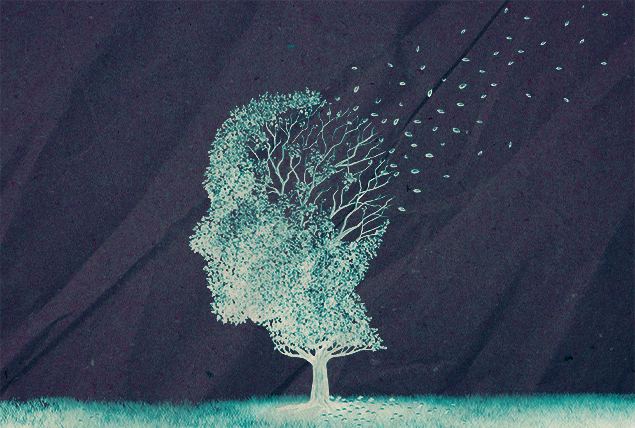Caring for Someone With Alzheimer's Disease

The Alzheimer's Association estimates that 6.5 million Americans ages 65 and older were living with Alzheimer's disease in 2022 and 1 in 3 seniors die with either Alzheimer's or another type of dementia.
Alzheimer's patients might also suffer from complications such as depression and other mental health issues, and sexual health can be a concern, too. The disease can affect a person's sex drive, most often lessening libido. In some cases, though, someone with Alzheimer's disease may show more interest in sex, and when this interest is excessive or obsessive, it's called hypersexuality. These behaviors are not always sexual in nature, however, and can instead represent a lack of comfort or feeling of pain, confusion or loneliness.
People with Alzheimer's disease are often cared for by loved ones, such as family members. The majority of people with Alzheimer's receive care in their homes, according to the Centers for Disease Control and Prevention (CDC). Thus, it's important for both patients and caregivers to learn about the disease, explained Nicole Purcell, D.O., M.S., a neurologist based in Harrisburg, Pennsylvania, and senior director of clinical practice at the Alzheimer's Association.
"[This includes learning about] disease symptoms, disease progression and common challenges facing caregivers," she said. "The more you know, the better able you are to plan for the future, including the ability to make informed decisions about future care planning as well as legal and financial matters."
Caring for someone with Alzheimer's disease
Understanding the symptoms of the various stages of Alzheimer's is helpful so you can plan ahead and help the patient cope with their symptoms. Here are six suggested ways that caregivers can ease their journey:
Create a routine
Try to keep a consistent daily routine, such as having meals, bathing and dressing at certain times, to reinforce a sense of familiarity in the person with Alzheimer's. Avoid making significant changes to this routine because it can be confusing for the patient. If the change is necessary, such as introducing new caregiving providers, it should be implemented gradually.
It's also useful to help them write down tasks, appointments and events in a notebook or calendar so they can feel part of their own routines.
Plan daily activities
You can keep your loved one engaged through various activities such as light exercise (walking, stretching), dancing, listening to music, baking, cooking, simple household chores (such as folding the laundry), watching movies, playing board games, visiting friends and family, or going out to the park or mall.
Try to plan outings when they're feeling at their best, which can vary from person to person. For example, if the person has more energy in the morning, you can plan for an outdoor walk in the park before they get tired later in the day.
You can create small cards about the person's condition to inform others, such as service workers, waiters or anyone else they might encounter. These cards can also be useful to warn people about any unplanned actions.
If the person requires medication, plan a system to remind them when to take it.
Encourage regular communication
As Alzheimer's disease can affect a person's ability to communicate, patients might have difficulties interpreting or remembering specific words. They might also lose their train of thought in the middle of a conversation.
To encourage the person to try to communicate despite facing difficulties, caregivers can use strategies such as maintaining eye contact when communicating, asking a single question at a time, using the person's name often, using open and relaxed body language, and always speaking in a calming voice.
Create a nutritious diet plan
People with Alzheimer's disease might lose weight, especially if they can't remember when they last ate, forgot how to cook, are no longer aware of mealtimes, lost the ability to smell and taste, or are having difficulty chewing and swallowing.
Here are some tips for caregivers to help ensure patients get the daily nutrition they need:
- Encourage them to take multivitamins
- Give the person enough time to eat
- Give them finger food, such as fruits and sandwiches, that is easy to chew and swallow
- Serve food on colorful plates to help highlight the food
- Serve meals at the same time every day
- Serve meals in a consistent, familiar place
- Turn off the radio or television to create a quieter dining environment
Help them with hygiene and grooming
Looking and feeling good can help boost the self-esteem of a person with Alzheimer's disease and make them feel less anxious and frustrated.
Caregivers can help the person with their grooming, such as encouraging them to brush their own teeth, trim their nails and shave, or helping them put on makeup (but avoid eye makeup).
Additionally, buy them loose-fitting and comfortable clothing with Velcro or zippers rather than laces or buttons.
Keep them safe
Many everyday situations can put Alzheimer's patients in danger. They may be unable to understand simple signs such as "wet floor" or recognize simple dangers at home such as sharp furniture. Falling down is an ever-present danger in even the safest environments.
Here are some tips to keep them safe:
- Get a sturdy shower chair to support them during showers and prevent falls
- Install safety locks on the stove
- Make sure they have sturdy, comfortable shoes with a good grip
- Paste bright-colored tape on the edge of any steps
- Place "hot" and "cold" stickers near the faucets
- Put padding on sharp corners of furniture
- Supervise them when they're taking medication to ensure that it's taken correctly
Resources, tips and advice for caregivers are available on the following websites: Alzheimers.gov, National Institute on Aging and the Alzheimer's Association.
Caregiving for people with Alzheimer's disease is often a thankless job, especially when the person with Alzheimer's slowly loses their ability to show appreciation for your hard work. The stress and hard work involved can lead to burnout, frustration, anxiety and even depression. It's important for caregivers to not neglect self-care and to prioritize their own support whenever needed.
Help, support and self-care for caregivers
"I tell family caregivers that no one needs to go through this disease alone," Purcell stressed. "It's really important to reach out for help; to your family, your personal network and to the Alzheimer's Association and other services in the community. The Alzheimer's Association has local offices in communities across the country and we are here to help."
The Alzheimer's Association also has a 24/7 helpline (1-800-272-3900) staffed by clinicians to help caregivers.
Reach out to other family members or loved ones to share the daily burden of caregiving if possible and schedule frequent breaks during the day. Remember, taking breaks does not mean you are neglecting your loved one with Alzheimer's disease. Caregivers who take good care of their own physical, emotional and mental health often provide better care and find more satisfaction in their caregiving roles.
Caregivers or other family members may need to take on new roles in the family, for example, dealing with matters such as finances that previously had been handled by the family member who is diagnosed with Alzheimer's. This change can be a stressful burden for the caregiver to take on.
"Often, these changes can cause anxiety and uncertainty," Purcell explained. "One of the biggest mistakes caregivers make is to try to do everything on their own. It is really important for caregivers to build a support network, including family, friends and the Alzheimer's Association and other local services in the community."
You can consider joining a support group to learn from other caregivers' experiences, as some of them may be facing or have faced similar challenges. Connecting with others can help you feel less isolated, anxious, fearful or hopeless.
"I often tell caregivers adapting to new roles that they do not have to be perfect, they just need to recognize and give themselves credit for doing their best," Purcell added.
Some caregivers might suffer from depression and grief as Alzheimer's progresses in their loved one. If you are struggling with your own mental health, it is important to seek professional help early so you can care for yourself and your loved one on a sustainable basis.
Alzheimer's disease aftercare options
When Alzheimer's disease reaches its late stage, particularly when patients lose their ability to communicate verbally and require help with basic daily tasks, it can be difficult for caregivers to manage on their own.
This is when caregivers should consider alternatives to provide their loved ones with the professional care they need.
Here are the various types of aftercare options that caregivers can consider in both the short and long term:
- In-home care. This allows the person with Alzheimer's to receive care in the comfort of their own home. Services can range from companion services, personal care and homemaker services to medical care by a licensed health professional.
- Adult daycare centers. These centers provide a safe environment for people with Alzheimer's disease to socialize and participate in activities. Services provided at the center may include counseling, medical health services, nutritional education, personal care, recreational activities, behavior management, therapy and other special needs. These centers can also provide caregivers with some respite from their daily caregiving duties.
- Long-term care. If the person with Alzheimer's requires professional care or prefers communal living, a few types of long-term care can be considered: retirement housing, which is suitable for people in the early stages of Alzheimer's as it provides limited supervision; assisted living, also known as board and care; nursing homes; Alzheimer's special care units, which can exist within other long-term care facilities such as assisted living; or life plan communities, which offer different levels of care depending on individual needs. Long-term care options are recommended when the person with Alzheimer's requires more care than can be provided at home, such as in the late stages.
- Hospice care. This focuses on end-of-life care for people who are in their final stages of Alzheimer's disease and have a life expectancy of six months or less. Its purpose is to manage pain and other symptoms, and treatment focuses on providing comfort instead of curing the underlying disease. Hospice care is often provided by a team of specially trained doctors, nurses, social workers, counselors and volunteers, and can be provided at home or a nursing facility.
Is finding a cure for Alzheimer's possible?
The Alzheimer's community was abuzz late in 2022 with news of a new drug, lecanemab, which was found to slow down cognitive decline in an Alzheimer's clinical trial. In January 2023, the U.S. Food and Drug Administration (FDA) announced accelerated approval for Leqembi (lecanemab-irmb) for the treatment of Alzheimer's.
Leqembi is the second of a new category of medications approved for Alzheimer's disease that target the underlying biology of the disease, thus, representing a potential breakthrough in the fight to treat the disease.
However, Kenneth M. Langa, M.D., Ph.D., a professor of medicine at the University of Michigan School of Public Health, is cautious about taking an optimistic stance on this progress.
"The recently published lecanemab results suggest that the medication may have a small benefit in slowing cognitive decline," he said. "But this and other medicines in the pipeline are definitely not cures for Alzheimer's disease or dementia.
"Over the last 20 years, it has become clearer that dementia in older adults is typically due to multiple overlapping pathologies, so I am pessimistic that there will ever be a cure, and the more appropriate and successful way to approach decreasing the risk of cognitive decline is to focus on good cardiovascular risk factor control—especially hypertension control—as well as staying socially and cognitively active in middle and older age," Langa said.
He added that Alzheimer's disease is not a single pathological process to be cured, due to the complexity of the brain and its pathologies.
"It will take a multipronged approach, including behavioral, medical and public health interventions, for example, making sure neighborhoods are safe and walker-friendly to decrease the risk for cognitive decline as individuals age," Langa concluded.


















